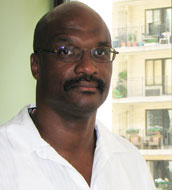Byron Halsey’s Stolen Decades
07.09.10
Three years ago today,
Byron Halsey
walked out of a New Jersey prison a free man after serving more than 19 years behind bars for two child murders he didn’t commit. Today he works as a truck driver and speaks out about the causes of wrongful convictions. In the wake of his exoneration, his home state has taken big steps toward reform to prevent future injustice.
Halsey’s long injustice began in November of 1985, when his living companion’s children were brutally murdered. Halsey immediately became a suspect because he lived with the children.
During 30 hours of interrogation about the crime, Halsey (who has a sixth-grade education and severe learning disabilities) offered varying accounts of the crime that did not agree with the evidence. On nearly every key fact, including the location of the bodies and the manner of death, Halsey initially gave incorrect answers and had to guess several times before answering correctly. The detective interrogating Halsey later said many of his answers were “gibberish” and that he seemed to be in a trance during the process. However, the final statement confessing guilt signed by Halsey mentions neither these inaccuracies nor the process that led to the statement. None of the interrogation statements were audio or video recorded.
Halsey was convicted, narrowly avoiding the possibility of a death sentence because he was acquitted of some charges. When the announcement was made that he would not be eligible for the death penalty, spectators in the courtroom jeered loudly. He was sentenced to two life sentences and twenty years. Beginning in 1993, Halsey repeatedly requested access to post-conviction DNA testing, but it wasn’t until July 2002, when New Jersey’s law granting post-conviction access to DNA testing took effect, that Halsey’s pursuit of post-conviction DNA testing finally moved forward. In 2006 the Innocence Project secured testing of evidence from the crime scene; the test proved Halsey’s innocence while implicating another man, Clifton Hall, who had briefly been a suspect at the time of the crime. When the test results came back, Hall was already in prison for three separate sex crimes.
In about 25 percent of the 255 wrongful convictions overturned through DNA testing to date, the defendant has given a false confession or admission. The videotaping of custodial interrogations can prevent false confessions and help law enforcement improve investigations and conduct training.
In 2005
, a special committee appointed by the New Jersey State Supreme Court recommended that custodial interrogations in major felony cases be recorded.
Other reforms are making significant progress in New Jersey as well. On June 21, a Special Master appointed by the New Jersey Supreme Court issued a landmark report strongly endorsing the Innocence Project’s recommendation for a new legal architecture to evaluate the reliability of eyewitness testimony. Read more about the report
here
.
Other Exoneree Anniversaries This Week:
Keith Brown
, North Carolina (Served 4 Years, Exonerated 7/7/97)
Alan Newton
, New York (Served 21 Years, Exonerated 7/6/06)

Leave a Reply
Thank you for visiting us. You can learn more about how we consider cases here. Please avoid sharing any personal information in the comments below and join us in making this a hate-speech free and safe space for everyone.